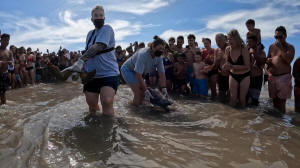|
The
turtles spent a month in animal rehab at the Fundación Mundo
Marino where scientists checked their swimming, helped with
their diet and gave them a chance to detox from plastics. They
were returned to the sea on the beaches of San Clemente.
"The turtles arrived, they were put in pools and their swimming
was measured to check it was normal," said Vanesa Traverso, a
biologist at the foundation.
"They are herbivorous so we fed them algae and one of them began
to defecate plastic, luckily it wasn't too much. Some 96% of the
turtles that enter the center defecate plastic."
The green sea turtles, classified as endangered, underwent blood
tests and even X-rays to check their digestive tracts and lungs.
Some previous ones had come to the center and excreted up to 22
grams of garbage that had been ingested.
"One of them had a high level of white blood cells and some
parameters that indicated a slight degree of anemia," said
Bianca Mancini, a veterinarian at the foundation. "We treated it
with a mix of antibiotics, a vitamin complex and iron."
(Reporting by Horacio Soria; Writing by Adam Jourdan; editing by
Diane Craft)
[© 2023 Thomson Reuters. All rights
reserved.] Copyright 2022 Reuters. All rights reserved. This material may not be published,
broadcast, rewritten or redistributed.
Thompson Reuters is solely responsible for this content.

|
|




